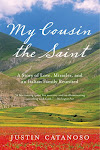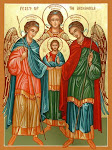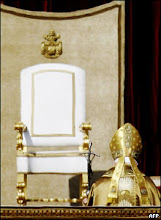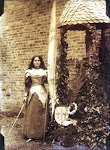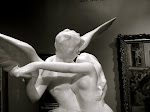
Wednesday, April 29, 2009
Why Jesus Had So Many Women Followers

Tuesday, April 28, 2009
Even Richard Brautigan Gets It...
When you take your pill
it’s like a mine disaster.
I think of all the people
lost inside of you.
Monday, April 27, 2009
OMG Does This Really Exist!?!?

SAINTS on Sunday

Friday, April 24, 2009
It's the Weekend!
Thursday, April 23, 2009
A Troubling Sign of the Times
Ever heard of Home Euthanisia Test Kits?
If not, I won't blame you because they were just introduced last May.
If you have, you must have read about it in one of America's leading news magazines, TIME, and you must have been deeply disturbed.
TIME magazine is promoting (promoting!) these home kits that test the deadliness of a specific overdose you would like to inflict upon yourself. And of course, this isn't just being sold to the crippled elderly who have been tormented by horrendous diseases for decades (the people euthanasia sympathists like to point to when trying to convince the masses of their agenda), but these kits are being targetted to troubled youth and the depressed.
Having suffered from depression for about a year now, I have to say that these kits outright offend me. The last thing a depressed teenager needs to here is how disposable their lives are and how easy it is to dispose of it! Are the days of suicide prevention really gone? How can anyone advocate that youth suicide is a positive, a right that should be protected by the government and encouraged through commercially availible death kits? Did Kurt Cobain's death mean nothing to these people?
The only words I have left about this whole euthanasia business (it really is becoming a business) are as follows:
terrifying
scary
disgusting
horrendous
degrading
mean
weird
disrespectful
horrible
sketchy
demoralizing
crazy
sadistic
...
...
...
Wednesday, April 22, 2009
The Gospel of the Poor
Tuesday, April 21, 2009
I Didn't Feel Like Waiting for Friday
A few days after they sent their letter they received a reply on beautiful vellum stationary. It was written in the most majestic script any of them had ever beheld and this is what it read:
My Dear Children,
You are all cherished members of my household, and I love each and every one of you equally. Please stop your petty bickering and get back to the good work that you should be
doing.
Your All Forgiving Father
God SJ
I have a sore throat

I should have made St. Blaise my Saint of the week. :[
Sunday, April 19, 2009
Saturday, April 18, 2009
Today I Am Obsessed With...
Friday, April 17, 2009
It's the Weekend!

Thursday, April 16, 2009
Happy Birthday Papa!

The candle that will not be blown out.
Personhood Part IV
There are certain genetic compositions that make a human being part of one species and not another. However, just as in the personhood problem, one characteristic of genetics is not sufficient to thoroughly define a human. Take for example the following statement, “a human is someone with forty-six chromosomes.” At first thought, this does not seem to be a problem. However, one has to consider those classified as human beings that do not possess a full set of 46 chromosomes or those who possess mutated sets. These humans would be those suffering from Down syndrome, trisomy 18, and Patau syndrome to name a few. Certainly those suffering from such disease are still considered to be of the same species as the rest of us. Also, certain physical characteristics cannot be the lone judge of what makes a human. Members of our species differ in skin color, hair color, eye color, height, weight, number of fingers, number of toes, etc. There are many attributes that all combine to form a member of the species we know as humans. As none of the previously mentioned genetic and physical characteristics solely determine membership of the human family, they also do not solely determine membership of personhood. Also, as shown with the regression problem, free will and reason do not solely determine membership. It is the combination of all of these aspects that make a human a person.
Harry Frankfurt delivers a well thought out argument if one agrees with all of his premises, particularly the first. However, most of his premises leave much room for doubt. His argument can easily fall into the trap of hard determinism if one considers the problem of infinite regression of our volitions and desires. Therefore, if we take his sole characteristics of free will and reason to be the only components of personhood, we too can fall into the trap of believing in its non-existence. What makes a person may not only be species-specific, but it is also not entirely volition-specific. Personhood is any combination of the two, uniquely and intricately woven into the make-up of every human.
It may seem silly to any non-philosophers as to why we debate this particular issue. Many cannot see exactly why it matters and how it impacts society in any way. To those people who consider the study of such philosophical issues unimportant, I point to historical examples when clear logical thinking could have saved millions of real, human lives. There is the example of slavery in America when our own government decided that a whole race of people were only 3/5ths a person because of a certain physical characteristic, their skin color. There is the example of the Holocaust in Nazi Germany when, once again, an entire race of people were classified as non-persons (and therefore disposable) because of their genetic make-up. It is essential to the world today to understand the true definition of personhood because of such dangerous applications possible in the real world. Therefore, I will conclude that personhood should be applied to all humans regardless of race, sex, age, stage of development, level of dependency, or socio-economic status. “A person is a person, no matter how small” (Horton Hears a Who!).
Works Cited
BonJour, Laurence, and Ann Baker. "Personal Identity and Free Will." Philosophical Problems. Pearson Education Inc., 2008. 275-83.
Horton Hears a Who! Dir. Jimmy Hayward, Steve Martino. Blue Sky Studios, 2008.
"Person." Def. 1. Merriam-Webster Online Dictionary. 2009.
Wednesday, April 15, 2009
Personhood Part III
The essential problem with his argument is the series of infinite regression that it implies (BonJour 283). In order to understand this explanation, one needs to know how Frankfurt defines second-order desires and second-order volitions. A second-order desire is defined as the wanting to have or not to have certain desires or motives. A second-order volition would be when a man “wants a certain desire to be his will” (BonJour 277). Frankfurt is saying that for a man to truly have free will and therefore be considered a person, he would have to have control over these second-order desires and volitions. If one accepts the existence of such orders of desires, one would begin to question exactly how many of them exist. Are there third-order desires that lead to second-order desires? Are there fourth-order desires? And so on. If all these higher numbered desires are determining all lower number desires, when does the man have free will at all? Now, it is easy to see how this infinite regression can serve a problem to the concept of free will. In a sense, the regression problem supports determinism – a view that all of a man’s desires have already been determined for him. If we therefore assume that no man has free will and free will is the only determinate as to what makes a person, then there are no people. The question of what makes a person then becomes moot. If Frankfurt would want to argue that there is at least one person in the world, then he would have to disagree with his own argument because of the problem of regression. Luckily, he includes later in his argument the condition of rationality in the definition of personhood. However, Frankfurt states that “the structure of a person’s will presupposes, accordingly, that he is a rational being” (BonJour 278). This hardly reconciles the problem previously discussed. The following argument structure follows this statement when taking the problem of regression into account:
If a man is a rational being, then the man has free will.
No one has free will.
Therefore, No one is a rational being.
Using modus tollens, it follows that no one would have reason and no one would have free will. This would therefore conclude that no one is a person.
Thankfully, this problem can be easily rectified by including other characteristics to the definition of “person.” Frankfurt has already rejected the idea that “person” should be used in a species-specific manner. However, if one could combine certain species-specific characteristics, free will, and rationality, then it is possible to create a good definition of “person” that does not fall prey to the regression problem. Thus, I will reject what is implied in Frankfurt’s thesis and in the first premise of the first argument discussed. Mentioning one characteristic is not enough to fully satisfy a definition. A clear example of this would be the multiple explanations dictionaries give for most words within its tome. One could not completely understand what "hat" means if one was only exposed to one characteristic of a hat. The same can be said for more complex definitions, such as "person."
Tuesday, April 14, 2009
Personhood Part II
Harry Frankfurt wrote about the characteristics of personhood in his article “Freedom of Will and the Concept of a Person.” The majority of his article focuses on what the term “free will” accurately means and discusses which situations constitute an expression of true freedom of will. However, his article delves into this question by first asking for the characteristics that define a person. He rejects the notion that “person” is the singular of “people” because he believes “the criteria for being a person do not serve primarily to distinguish the members of our own species from the members of other species” (BonJour 275). In this particular section of his argument, his thesis statement would be that the definition of person “[is] designed to capture those attributes which are the subject of our most humane concern and the source of what we regard as most important and most problematical in our lives” (BonJour 275). To Frankfurt, the single most important aspects would be true freedom of will and rationality. At first glance, Frankfurt’s position seems uncontroversial, thought out, and sound. One needs to start breaking down what his premises are really saying to discover his conclusion and determine that his argument is not as strong as previously thought. The
following is a simplified version of his argument:
1. Our concept of ourselves as persons is not to be understood as a concept of attributes that are species-specific.
2. Essential to persons are characteristics that are uniquely human.
3. One characteristic that is uniquely human is the structure of a person’s will, particularly second-order desires.
4. Therefore, it is having second-order volitions that is essential to being a person.
As noted before, at first this seems like a highly uncontroversial stance. It is only when certain premises are called into question that the argument starts breaking down.
Monday, April 13, 2009
Personhood Part I
Horton says, "A person is a person, no matter how small" (Horton Hears a Who!). From this famous elephant's statement the question arises as to what a person exactly is. To understand what a person is, one needs not to look any further than a good definition. One can be found in the Merriam-Webster Dictionary that defines “person” as a “human, individual” (“Person” def. 1). However, there are some philosophers, such as Harry Frankfurt, who would not completely agree to this definition. With a good definition, it is important to recognize the characteristics of an item to understand what the word actually means. For example, one could not accurately define a hat unless one gave an essential characteristic of a hat - be it its shape, structure, or placement on the body. Therefore, it is necessary to determine what characteristics are in place for a person to be a person. "Person" should not be defined by only one characteristic, rather, its definition should involve a vast assortment of qualities that are brought together uniquely for each individual.
Sunday, April 12, 2009
The End of the Best Week Ever

Sunday, April 5, 2009
Saint on Sunday
Friday, April 3, 2009
It's the Weekend!

Oh yeah..
...and Patrick Madrid is funny.
He posted this wonderful joke on his blog today:
An old Catholic priest lay dying in the hospital. For years he had
faithfully served the people of the nation's capital, Washington, D.C.He
motioned for his nurse to come near."Yes, Father?" said the nurse."I would
really like to see Harry Reid and Nancy Pelosi before I die," whispered the
priest."I'll see what I can do, Father," replied the nurse.The nurse sent the
request to them and waited for a response. Soon the word arrived. Harry and
Nancy would be delighted to visit the priest. As they went to the hospital,
Harry commented to Nancy "I don't know why the old priest wants to see us, but
it will certainly help our images." Nancy couldn't help but agree.When they
arrived at the priest's room, the priest took Nancy 's hand in his right hand
and Harry's hand in his left. There was silence and a look of serenity on the
old priest's face.Finally Nancy spoke. "Father, of all the people you could have
chosen, why did you choose us to be with you as you near the end?"The old priest
slowly replied "I have always tried to pattern my life after our Lord and Savior
Jesus Christ." His voice trailed off . . .After a pause, he continued . . . "The
Lord died between two lying thieves, and I would like to do the same." {source}
Thursday, April 2, 2009
I thought I went to a Catholic school?
My Jesuit college in Mobile, AL has a nice student newspaper. Even though they tend to devote more pages to sports than current events, it's still a great improvement over what my high school called a newspaper. At least, I thought it was.
Today, after I had finished a history quiz by writing an essay on Pope Gregory VII and King Henry IV and the struggle of the Church verses the State in Medieval Europe, I stumbled across the latest issue of our newspaper.
I turned right to the editorial page, because opinions are my favorite.
To my shock and disgust, there was an opinion written about euthanasia - and no, trust me, it did not at all fit with the Catholic Church's teaching on the subject. It was a very pro-euthanasia article. Not only was that, in itself, highly offensive to me, but I also had to sit there and read about how Terri Schiavo was a perfect case for euthanasia gone right.
WHAT?
First of all, it is all too clear that the writer did not do her research when it came to poor Terri. Although this opinionated writer claimed Terri was an extreme case who needed extreme measures to be kept alive -that is very much not the case. Terri Schiavo was not euthanized by the removal of a complicated machine that was keeping her heart, lungs, or brain functioning. No. She was killed by starvation. She was denied BASIC medical treatment - the support of food and water in a hospital. Food and water? Are those really "extreme measures" to keep someone alive? Really?
That is most definitely NOT the perfect story in support of euthanasia. It is, however, the perfect case to show how far-reaching a pro-euthanasia society can go. Although Terri expressed no want of death and her family was overwhelmingly supportive of her future care, the culture of death ultimately won. A woman was killed. She was not "put down for mercy's sake." The impact of her death is most notable on her family's website. They continue to fight for the rights of the ill and dependent and should be commended for their courage and true compassion. I have no doubt that they would be completely offended by the comments of that article.
Secondly, the article said absolutely nothing about the other side of the debate. In particular, it did not mention any of the Church's teachings on the subject - even though it was in a Jesuit school newspaper. Shouldn't all good articles at least acknowledge that there is an opposing side?
How far gone are our Catholic universities? Free speech in the newspaper in one thing, but at least have some sort of balance of opinions. If not that, at least acknowledge the existence of the USCCB.
Are the Catholic universities dying? Are their mission statements really so worthless to the student body that an anti-Church article can be so freely published without any counter?
At least we aren't Notre Dame.





